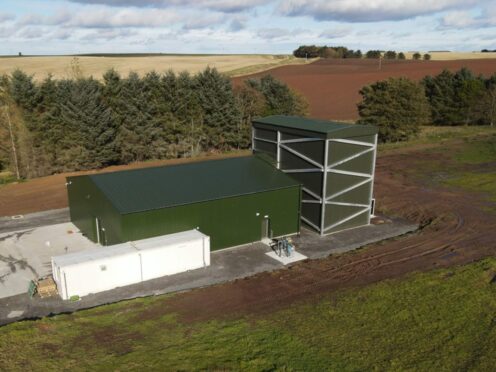A farm in the north-east of Scotland is experimenting with growing alternative crops, including nutrient-dense microgreens and vanilla, as part of its diversification to fill a fallow time of year.
The 300-acre Waterside Farm, which grows wheat, barley, rye for distilling and hemp, recently invested in a vertical farm tower to grow alternative crops throughout the year and secure income year-round for the farm.
Graeme Warren, who manages the farm and the vertical farm business, Vertegrow, for owner Martin Dickie and managing director of Brewdog, said he was looking at ways he could diversify the business.
“There’s not much that grows in the north-east of Scotland outside April to October, so we were looking at ways we could diversify the business to fill the other six months of the year,” he said.
“Due to Martin’s background in food and drink, we knew there was demand for fresh, local produce from the restaurant trade and local retailers.
“With consumers and businesses also increasingly discerning about how their food is grown and its sustainable credentials, and accustomed to buying outside seasonality, the vertical farm ticks a lot of boxes.
The main focus at Vertegrow has been on growing leafy and micro greens and herbs in the nine-metre tower, which was installed on the farm last autumn following two years of experimentation in shipping containers.
Just recently, the company was awarded research funding alongside the James Hutton Insitute and the Rowett Institute to work with a major retailer to improve the nutrient profile of certain plant products for the health-conscious consumer.
Other trials using the IGS tech include tree saplings to meet the extraordinary demand for forestry planting, ‘ripen at home’ produce, and bringing on strawberry plants for Scotland’s fruit growers.
Due to a world shortage of vanilla, Vertegrow is currently experimenting, with the support of IGS’ crop scientists, to see if it can generate 3-4 annual flowerings as opposed to the 1-2 in the crop’s origin countries such as Madagascar and India.
Here in the UK, IGS CEO David Farquhar cites the absence of salads on supermarket shelves earlier this year to illustrate how by growing some produce in these controlled conditions, we could reduce our reliance on imports and give farmers greater certainty.
“Vertical farming complements, not competes with, field-scale farming,” he said.
“We can reduce our reliance on imports across a range of produce that we couldn’t grow otherwise but also the environmental burden these incur. It also gives farmers a greater control over costs and management: it removes the weather or disease unknowns and the need for chemical inputs or fuel and uses only the energy and water needed to create the perfect conditions to maximise yields.
“Not only can it provide diversified income for UK farmers but the potential lies in how it could offset labour shortages, attract a different, tech-orientated demographic into agriculture and produce more food from less land, while all the time reducing the impact on the environment on a number of levels.”
Vertegrow features as part of this year’s RHASS Presidential Initiative, unearthing the science behind food and drink production.

